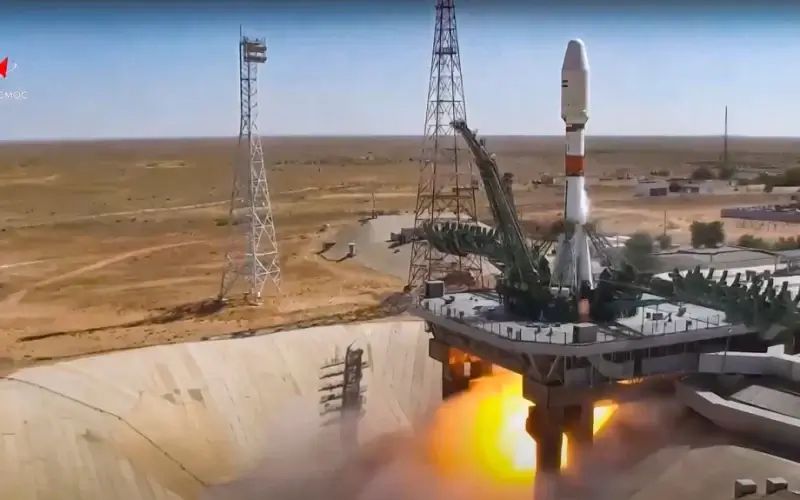In Baikonur, Kazakhstan, reports indicate Iran's acquisition of a new satellite with surveillance capabilities presents a grave problem for Israel because of its ability to monitor classified sites in the country, snapping high-resolution photographs of objects on the ground.
The latest development from Iran comes as the regime just wrapped up another round of talks with the West over the country's nuclear program while increasing and upgrading its defensive and offensive measures against Israel, Arabs states, and the United States.
According to reports, the Khayyam satellite, built and launched by Russia on behalf of Iran, flew into orbit Tuesday from the Russian-controlled Baikonur cosmodrome in Kazakhstan, bordering Russia.
Photographic imagery revealed a Russian Soyuz rocket lifted off to carry Iran's Khayyam satellite into orbit at the Russian leased launching site. Shortly afterward, Iranian-state media reported that the spacecraft sent its first telecommand upon arriving on course in space.
In a statement to western media outlets, the Islamic Republic of Iran's Space Agency explained that the satellite's purpose involves agriculture and water resource planning. In Tehran, the Russian embassy stated that the spacecraft's design is for non-military purposes. However, Western experts familiar with Iran's satellite capabilities argue that Russia's and Iran's explanations are untrustworthy.
Instead, experts argue that the satellite is for spying against the regime's enemies through means that were thought unattainable for the Islamic government. Many say this presents a significant challenge for Israel and its military capabilities against Iran, given that the mullahs will be able to collect accurate intelligence information on Iranian military forces and proxy groups like Hezbollah.
When confronted with the concerns that Iran is planning to use its new satellite for nefarious purposes, the head of Iran's Space Agency, Hassan Salarieh, rejected such notions from media outlets calling it "childish." Salarieh stated that the satellite's mission is to manage urban management, natural resources, mines, and agriculture. While the regime maintains this stance, reports indicate that officials in Iran's Islamic Revolutionary Guard Corps (IRGC) have stated that the satellite will be able to monitor U.S. military bases and Israel.
The actual satellite is half a ton with a resolution of 1.2 meters and is in orbit at around 310 miles above Earth, allowing it to photograph objects equal to that size. Some Western officials believe that Russia will also benefit from this satellite, using it to assist in its ongoing invasion of Ukraine. Security experts see the satellite's launch on Russia's Soyuz rocket as another example of Iran and Russia's strategic cooperation.
When Vladimir Putin ordered the Russian military to invade Ukraine in February 2022, Iran and many other rogue regimes voiced support for the invasion, providing the Russian government with economic and military resources. In return, Russia has helped the Ayatollahs with monetary and military resources, allowing the regime to keep itself alive and support its army and terrorist proxies in the Middle East. In the past, Iran has tried to launch satellites capable of monitoring Israeli and American military forces because of the lack of technology and the efforts by the Israeli government to thwart such projects.
In response to Iran's technological advancements, Israel has strengthened its military forces and defensive capabilities, supporting projects like the Iron Beam to defend against Iranian missiles launched from Hamas, one of Iran's major terrorist proxies. In Washington, officials worry that such a satellite launch system will be used with Iran's ballistic missile system, allowing the regime to deliver a nuclear warhead, something the mullahs have denied.
Currently, the Biden administration is attempting to revive the 2015 nuclear agreement with Tehran, hoping to curb Iran's nuclear program while removing economic sanctions against the regime. The ongoing negotiations have reached a stalemate as both sides have not agreed to different measures or concessions. With new talks in Vienna, Iran continues to upgrade its military technology and support terrorist proxies in Yemen, Iraq, Lebanon, Gaza, and Syria while enriching its uranium material for nuclear weapons-grade level.










